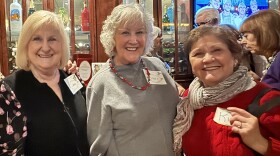Over one-hundred fifty years ago today, President Abraham Lincoln delivered the "Gettysburg Address."
At a scant 272 words, it has become Lincoln’s most famous speech and is one of American history’s best known as well.
But there’s a lot that isn’t commonly known about the context in which it was delivered, and our Civil War contributor Thomas Martin Sobottke offers these little-known facts.
1. Lincoln wasn't the keynote speaker.
Edward Everett was considered the greatest orator in the North, and was invited to be the keynote speaker for the dedication of the Gettysburg National Cemetery. President Lincoln was only to make a few remarks.
Everett's speech gave a play-by-play of the Union exploits at Gettysburg and made allusions to Greek history, and lasted two hours. Everett later wrote to Lincoln that the President had accomplished in two minutes what it took him in two hours.
2. Gettysburg was the place to be.
After so much grief and loss, people in the North felt a turning point had come with the Battle of Gettysburg. and they wanted to be there for the dedication of the national cemetery for the Union war dead. Fifteen thousand people came to the town for the dedication, knowing it would be a momentous and historic occasion.
The problem was Gettysburg was a town of only 2,500 people. Visitors doubled and tripled up in beds. A prominent Adams County attorney David Wills had 38 lodgers staying at his home the night before the speeches - despite a very pregnant Mrs. Wills. Even the governor of Pennsylvania had to share a bed. The only two guests in the Wills House to get their own beds were Everett and the President.
3. Lincoln gave an impromptu pre-speech the night before the Address.
The night before the dedication, Lincoln addressed a couple hundred people who had gathered in the square below the Wills House. He made a couple jokes and mostly told the restless crowd to wait for his formal speech the following day.
Lincoln then went inside to make final word changes and put the last polish on his famous speech. Contrary to popular belief that he wrote the speech on the fly while traveling by train to Gettysburg, Lincoln had worked hard on the speech, and historians know of at least two prior drafts.
4. A Lincoln staffer got drunk the night before.
The atmosphere was somber during the actual dedication, but the night before, crowds of visitors were happy in anticipation of the speeches they would hear the following day. A few dozen students at Gettysburg College were getting drunk, and Lincoln's personal secretary, and later U.S. Secretary of State, John Hay, who was close in age, joined them.
5. The cemetery was only for Union war dead.
An independent group of influential residents raised funds to turn the battlefield into a national cemetery, honoring the Union war dead lost in the battle. Confederate soldiers who were killed in the battle were either brought "home" to the South or lost to history.
For months after the fight was over, guns, cannons, backpacks and canteens still littered the ground; an explosive even killed two boys who found it on the field long after the battle.
6. Bodies were being buried right next to dedication ceremony.
As the dedication ceremony got underway, soldiers and dignitaries marched up Baltimore Street to Cemetery Hill. But a burial party of a half a dozen people, including one white man and several black men, were burying a number of corpses nearby. This helped set the appropriate somber mood of the commemoration.
7. Lincoln thought it was a good speech, but not everyone agreed.
Lincoln knew he had given a good speech, and even hand-copied five speeches to give to friends, including a sober John Hay.
The speech was well-received by the public attending the event. They clapped politely, a few cheered. But not everyone got the full effect of the speech, especially if they were far from the stage.
The newspapers at the time were divided. Republican-leaning papers, supportive of the President, celebrated it, as did "war Democrat" papers. But newspapers that supported the so-called "peace Democrats" who sympathized with the South dismissed it as a weak and poorly delivered speech, like the Patriot-News of Harrisburg, Penn.
That said, 150 years later, that paper has issued a retraction of its original review of the speech.
Thomas Martin Sobottke is a historian, author and educator. Stephanie Lecci no longer works at WUWM, she is now at St. Louis Public Radio. This piece was originally posted on November 19, 2013.





